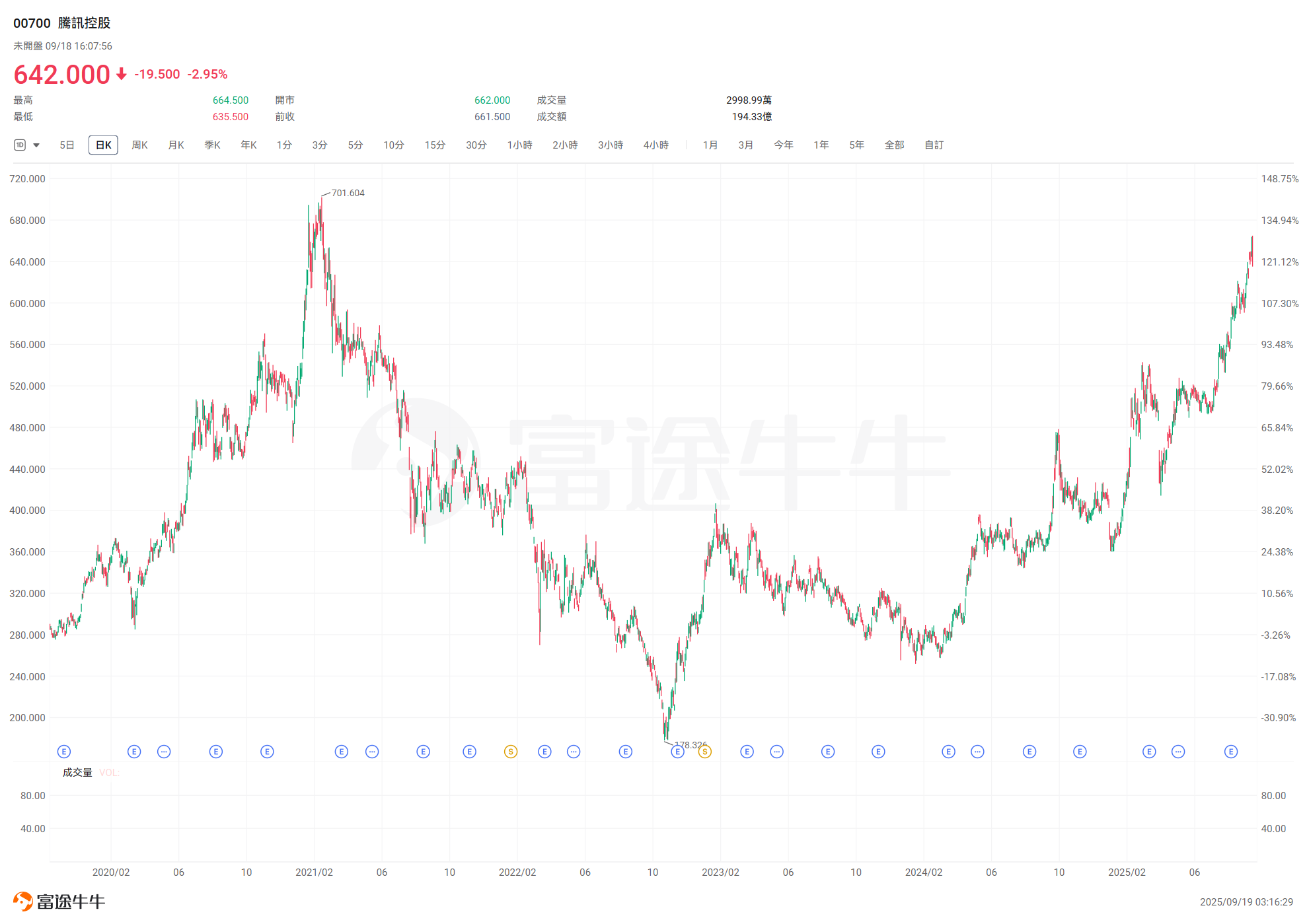Fully open AI capabilities.
Over the past year, the application of large-scale AI models has been accelerating. The rapidly advancing AI wave is exponentially driving up global demand for computing power. In this global AI arms race, whoever can provide accessible and efficient computing power will become one of the key winners at the table.
At Tencent’s annual flagship To B industry event—the Tencent Global Digital Ecosystem Conference—Tencent’s deployment in computing power also garnered significant attention.
 Tencent Cloud announced that currently, $TENCENT (00700.HK)$ it has fully adapted to mainstream domestic chips. Meanwhile, a long-term strategic focus for Tencent Cloud is the full-stack optimization of software and hardware synergy, integrating different types of chips through its heterogeneous computing platform to provide cost-effective AI computing power externally.
Tencent Cloud announced that currently, $TENCENT (00700.HK)$ it has fully adapted to mainstream domestic chips. Meanwhile, a long-term strategic focus for Tencent Cloud is the full-stack optimization of software and hardware synergy, integrating different types of chips through its heterogeneous computing platform to provide cost-effective AI computing power externally.
In other words, despite its focus on software, Tencent is also committed to building robust AI infrastructure. Moreover, against the backdrop of an increasingly strong trend toward the localization of chips, Tencent’s comprehensive adaptation efforts have undeniably added momentum to the domestic computing power ecosystem.
Of course, the competition in large-scale AI models is a marathon. Tencent’s core advantage in AI lies in its wide range of applications. Therefore, for a considerable period following the rise of the large AI model wave, Tencent has not rushed to capture AI-related markets but prioritized empowering its in-house massive business operations and self-developed large models.
After more than two years of effort, AI technology has become a core growth engine for Tencent and Tencent Cloud, with a reinforcing positive cycle between AI investment and high-quality growth. Against this backdrop, Tencent has shifted from a defensive to an offensive AI strategy this year, revealing a more proactive and open stance.
AI is also driving a revaluation of Tencent, with its stock price recently hitting a near four-year high. Returning to its market capitalization peak of 7 trillion Hong Kong dollars no longer seems far off. However, this is unlikely to be the end, as the market anticipates that AI will reshape Tencent and unlock even greater potential.

Revenue from computing power
Three years ago, Tencent Cloud proposed ‘preferring 150 jin of muscle rather than 200 jin of flab.’ After three years of transformation, focusing on self-developed technologies and strengthening integration, Tencent Cloud has now gained significant recognition within the broader Tencent Group.
Dowson Tong, Senior Executive Vice President of Tencent Group and CEO of its Cloud and Smart Industries Group, revealed that in the second quarter of 2025, Tencent’s B2B revenue achieved double-digit growth, reaching RMB 55.5 billion. The scale of Tencent Cloud’s overseas customers doubled year-on-year in the past year.
I can proudly say that after several years of continuous focus on core products and technology, trimming the fat and building muscle, Tencent Cloud has become a highly competitive ‘robust player’ in the cloud market.
There is no doubt that AI has become a strong driver of Tencent Cloud’s growth. In the second quarter of this year, Tencent Cloud’s revenue growth accelerated compared to recent quarters, mainly due to increased demand for AI-related services from enterprise clients, including GPU leasing, API token usage, and growth in merchant technical service fees.
Computing power is indeed a lucrative business. Dowson Tong told Wall Street Insight that the AI wave has undeniably driven demand for Tencent Cloud’s AI infrastructure, and going forward, revenue from AI-related businesses will see even more pronounced growth in AI infrastructure.
Tencent’s investment in computing power has also been substantial. According to Tencent’s financial report, since the strategic acceleration in the fourth quarter of last year, Tencent’s cumulative capital expenditure as of the second quarter of this year reached RMB 83.16 billion, primarily used to support the development of AI-related businesses.
At the earnings meeting in August, Tencent’s management also stated that Tencent has sufficient chips to train and continuously upgrade existing models. Additionally, Tencent is enhancing inference efficiency through extensive software-level optimizations, allowing it to handle more workloads with the same number of chips.
Li Qiang, Vice President of Tencent Group and President of Government and Enterprise Business, pointed out that as a cloud computing provider, under the backdrop of AI+, the first step should be to build more extensive and robust computing power support, which is the infrastructure that will benefit all industries. In the second half of this year, Tencent will continue to invest, including constructing a relatively large-scale AI infrastructure globally.
Full compatibility with domestically produced chips is undoubtedly an important step for Tencent Cloud to enhance its AI infrastructure.
Tang Daosheng explained that Tencent is collaborating with multiple chip manufacturers for adaptation. In fact, there are many types of models, both large and small. In different scenarios, the required chip configurations vary, so Tencent will continue to cooperate with multiple vendors.
In other words, while some tech giants are directly entering the field of chip manufacturing, Tencent has chosen to focus on software, model development, and digital technology, adopting an open approach to collaborate with various chip manufacturers.
At this conference, Tencent Cloud Intelligence unveiled a significant upgrade aimed at creating an AI Infrastructure ‘closer to Agent.’ It introduced a comprehensive solution, including the Agent Infrastructure solution, Cloud Mate expert service intelligence, and full-link security capabilities, to help Agentic AI transition from ‘lab’ to ‘production-grade.’
Li Li, Vice President of Tencent Cloud, stated that as the number of Agents grows explosively, enterprises’ demand for cloud computing infrastructure will rapidly shift from ‘resource provisioning’ to ‘business value.’ The AI Infrastructure must deliver faster inference efficiency, more flexible tool integration, more reliable system assurance, and more automated service capabilities.
It is reported that the core advantage of Tencent Cloud’s intelligent computing system lies in its ‘homologous and homogeneous’ architecture, eliminating the need for dedicated AI storage facilities. By leveraging its refined cloud-native capabilities, it can meet intelligent computing demands and achieve deep synergy between cloud and intelligent computing capabilities.
AI Landscape
Tencent Cloud serves as Tencent’s window for delivering AI capabilities. At this Global Digital Ecosystem Conference, Tencent Cloud announced it would fully open up its accumulated technical沉淀and AI practices, while bridging the technology and scenarios for both C-end and B-end users.
This undoubtedly marks a milestone moment for Tencent Cloud. Last year, Tencent Cloud explicitly identified AI, globalization, and integrated innovation as the main avenues for future growth. At this conference, AI and globalization emerged as the two core themes, showcasing more achievements before the audience.
Regarding the highly anticipated AI sector, Tencent has now built a full-link product matrix around large models, encompassing underlying infrastructure, self-developed large models, model development platforms, intelligent agent development platforms, and diverse intelligent applications tailored to specific scenarios, enabling enterprise clients to quickly deploy large models into real-world use cases.
At this conference, Tencent also introduced the ‘Tencent Cloud Intelligent Agent Strategic Blueprint,’ along with Tencent Cloud Agent Development Platform ADP 3.0, Agent Infrastructure Solution Agent Runtime, Tencent Cloud Expert Service Intelligence Cloud Mate, and the HunYuan 3D 3.0 base model.
Notably, earlier this year, Tencent consolidated several AI products and applications targeting the C-end market—such as Yuanbao, QQ Browser, and ima—under Tencent Cloud. Consequently, Tencent Cloud now shoulders the responsibility of developing AI products for both B-end and C-end markets.
As a pioneer of Tencent’s AI-native applications for the C-end market, Yuanbao has rapidly upgraded its capabilities in search, document comprehension, and image processing since the beginning of this year. During this conference, Yuanbao took center stage alongside Dowson Tang, demonstrating its question-answering abilities on-site.
According to data provided by Tencent, the number of daily questions users ask Yuanbao has reached the total volume that was recorded in an entire month at the beginning of this year. Additionally, Yuanbao has become one of the top three AI-native applications in China in terms of daily active users (DAU).
Moreover, Yuanbao continues to integrate deeply with Tencent’s existing applications. It is now interconnected with over 10 applications, including Tencent Meeting, Tencent Docs, WeChat, Tencent Video, and QQ Music.
Dowson Tang noted that following the organizational restructuring earlier this year, Tencent Cloud has gained more room to operate and expanded capabilities allowing it to bridge the C-end and B-end markets, making products on both sides more competitive. “We are still very excited about this.”
However, Dowson Tang also told Wall Street News that AI-native applications targeting the C-end market are still in the investment phase. Tencent Cloud has not yet deeply considered commercialization and remains focused on refining product offerings and service experiences. For instance, Yuanbao and ima will increasingly focus on enhancing user experience and expanding scenario coverage, enabling users to address practical problems more naturally and efficiently.
Under sustained investment, Tencent’s AI application landscape—from B-end to C-end—is unfolding comprehensively. Simultaneously, AI has become Tencent’s ‘new business gene,’ driving robust growth in core businesses such as gaming and advertising.
Capital markets have responded enthusiastically to Tencent’s AI strategy achievements, pushing its market value to briefly return to HKD 6 trillion on September 17, reaching a four-year high.
Global technology giants have joined the effort to reshape their businesses using AI, and the ‘AI content’ has become a critical metric for capital markets to reevaluate a tech company. Although AI commercialization is still in its early stages, Tencent has clearly secured a strong position.
Editor/joryn

